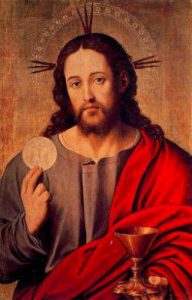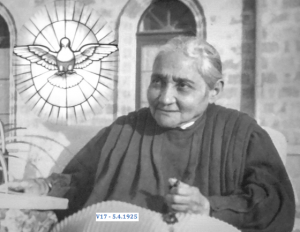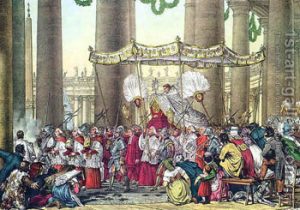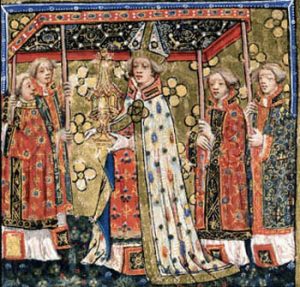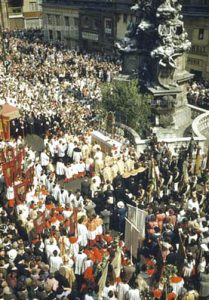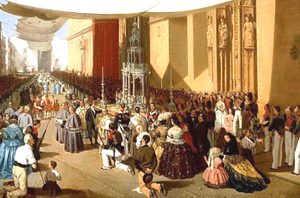Feast of the Most Holy Body and Blood of Christ, The Feast of Corpus Christi In the Divine Will
Feast of “Corpus Domini”
Book of Heaven; Volume 24 – June 12, 1928
…it was the Feast of Corpus Domini, I was thinking to myself that this day was the feast of the marriage which blessed Jesus did with souls in the Most Holy Sacrament of love. And my beloved Jesus, moving in my interior, told me: “My daughter, the true marriage with humanity was done in Creation. Nothing was lacking either to the soul or to the body; everything was done with royal sumptuousness. An immense palace was prepared for the human nature, such that no king or emperor can have one similar to it, which is the whole Universe: a starry heaven and its vault, a Sun which would never extinguish its light; flourishing gardens in which the happy couple, God and man, was to stroll, amuse itself and maintain the continuous, uninterrupted feast of our marriage; and garments, woven not with matter, but formed of purest light by Our power, as befitted royal persons… Everything was beauty in man, soul and body, because the One who prepared the marriage and formed it was of unreachable beauty. So, from the external sumptuousness of the so many enchanting beauties present in the whole of Creation, you can imagine the interior seas of sanctity, of beauty, of light, of science, etc., which the interior of man possessed. All the acts of man, interior and external, were as many musical keys which formed the most beautiful melodies, sweet, melodious, harmonious, that maintained the joy of the marriage. And each additional act that he would dispose himself to do, was a new little sonata that he would prepare, to call his spouse to delight with him.
My Divine Will which dominated humanity, brought him the new continuous act and the likeness to the One who had created him and married him. But in such a great feast man broke the strongest bond, in which lay the whole validity of our marriage and through which it had been in force: he withdrew from Our Will. Because of this, the marriage was broken, and since all the rights were lost, only the memory of it was left, but the substance, the life, the effects no longer existed. Now, the Sacrament of the Eucharist in which my Love overabounded in all possible imaginable ways, cannot be called either the first or the true marriage of Creation, for I do nothing but continue what I did when I was on earth. According to the needs of souls, with some I make Myself a compassionate doctor in order to heal them, with some a teacher to instruct them, with some a father to forgive them, with some light to give them sight. I give strength to the weak, courage to the timid, peace to the restless – in sum, I continue my redemptive life and virtue; however, all these miseries exclude the true marriage. No young man marries a young woman who is ill – at most, he waits for her to recover; or a young woman who is weak and who offends him very often. And if the groom is a king and loves her, at most he waits for the bride to get well, to love him, and for her condition to become somehow satisfactory, and not so inferior to his. Now, the condition in which poor humanity finds itself is still that of a poor ill one, and I am waiting for my Will to be known and to reign in the midst of creatures, for It will give them true health, royal garments, and a beauty worthy of Me. Then will I form again the true and original marriage.”
Thursday, May 31, 2018
We (the little family of Luisa) will Joyfully Celebrate, in our own communities,
The Solemnity of Corpus Christi also as “our wedding day with the Lord”
because we are linked to the Servant of God, Luisa Piccarreta
Volume 24 – 6/12/28
Since it was the Feast of Corpus Domini, I (Luisa) was thinking to myself that that day was The Feast of the Marriage that Blessed Jesus did with souls in the Most Holy Sacrament of Love.
Volume One
“. . . In this state of sufferings I (Jesus) will purify your soul thoroughly, in such a way as to dispose you to form a Mystical Marriage with Me; and after this, I (Jesus) will make the Last Transformation, in such a way that both of us will become like two candles placed on the Fire – one is Transformed into the other and they form a Single One.”
Volume 36 – 5/17/38
Then He added with more Loving Tenderness:
“My good daughter (Luisa), My Love wants to be tied more and more to (you) the creature, and the more Truths It (My Divine Love) Manifests regarding My Most Holy Divine Will, the more bonds I (Jesus) put between God and herself.
In Manifesting the Truth, My Divine Love is preparing the Marriage between God and the soul.
The more It Manifests the more Pomp and Magnificence this Marriage will have.
Would you like to know what happens then?
My Truths will be like the dowry needed in order to marry God; to get to know the One (God) who lowers Himself and even ties Himself—only for Love—in the bond of Marriage.
My Truths touch the creature over and over; They mold her to a New Life;
They (My Truths) return her to the Beauty of Our Image and Resemblance from the time she was Created, and Impress on her Their kiss of inseparable Union.
Just one of Our Truths can make a Sea of Prodigies and Divine Creations in the soul who has the goodness to listen to It.
One Truth can turn a perverted world into a Good and Holy one, because It is one of Our Lives, exposed for the Good of all.
It is a New Sun that We raise in created intellects; a Sun that will let Itself be known through Its Light and Heat, turning into Light and Heat whoever wants to listen.
Therefore, hiding a Truth that We give from Our Paternal Womb, with so much Love, is the greatest crime. It deprives human generations of the Greatest Good.
Further, one (Luisa and those linked to Luisa) who Lives in Our Most Holy Divine Will, by Marrying Us (Triune God), makes a Feast for all Saints.
All of them participate in this Divine Wedding and, because of It, they have their own party in Heaven and another one on earth.
Each act the creature does in Our Most Holy Divine Will is a Feast; a table sumptuously decked for the Heavenly Regions.
In return, the Saints give New Gifts.
They beseech the Lord to Manifest more Truths to the soul (Luisa), to broaden more and more the boundaries of the dowry that God gave to her (and to those linked to her.”)
“When one is linked to Luisa, one will also possess the Mystical Marriage because of her”
Fiat!
The Origin of the Feast of Corpus Christi
Gregory Johnson
CORPUS CHRISTI PROCESSION IN A CONCENTRATION CAMP
Father Stephan Treuchel, S.A.C.
Introduction
“Corpus Christi Procession in a Concentration Camp” is a Testimony of the profound faith of imprisoned priests, written by a survivor of the Nazi persecution, Father Stefan Treuchel, S.A.C., member of the Polish Province of the Pallottine Fathers. It is presented here by his classmate, Father M. Ignatius Curzydlo, S.A.C., chaplain of the V.A. Medical Center, Canandaigua, New York.
We express our gratitude to the unnamed lay persons who have underwritten the costs of producing this article.
————————————————————————————————————-
The thermometer was rising heavenward on the third day of June in 1942. We were 120 priests interned at Dachau and our chief occupation lay in the building of a so-called “Barrack X.” The handling of masonry was very exacting of our strength and the extreme heat took toll of all our energy. Moreover, we were starved and craving for water and the strict surveillance of our captors, who did not permit even the shortest respite was almost more than we could humanly bear.
Our only consolation lay in silent prayer and Holy Communion stealthily though seldomly received. Sometimes at noon, our Kapo[1], Karl Wagner and Hilfskapo[2] Gustav Eberle, former Communists who had fought with the Reds in the Spanish Civil War, and their helpers sought to escape the intense heat and retire into shade, and so we stopped working and instead our hearts were turned to the Throne of God in hearty prayer.
On this certain day in June, I stood beside Father Bronislaus Szymanski, (a fellow prisoner), who formerly served as a curate at a church in Suwalki[3]. We were pretending to be using our trowels and hammers vigorously, when in reality we were trying to deaden our low chanting of the Litany to the Sacred Heart of Jesus.
June the month of the Sacred Heart! How we wished to pay homage to this divine heart; yet, every means was denied us. We endeavored whenever possible, to recite the Litany to the Sacred Heart. This was done amid distraught distractions and many interruptions and it was sometimes after a long time that we were able to conclude, Sacred Heart of Jesus, delight of all the Saints, have mercy on us.
After the Litany on this memorable day, Father Bronislaus, after cautiously looking around whispered, “Father Stefan, will we be able to receive Holy Communion tomorrow?” “Why tomorrow?” I questioned. “Why especially tomorrow?”
“Because tomorrow is the Feast of Corpus Christi!”
Almost simultaneously with Father Bronislaus’s answer, Gustav came in view and with his unrefined and indelicate, “Auf, auf,” compelled us to return to work. I pretended to return for my tools for another word with Father Bronislaus, but for this I was brutally kicked and cursed at.
I hardly took notice of this for one incessant echo rant in my soul—tomorrow, Corpus Christi!
Dear God! Where will I obtain the Blessed Sacrament? True, not a distance from us were a group of German Priests, but we were entirely prohibited any conversation with them. Altar bread and wine—we had none!
But tomorrow—the feast of Corpus Christi!
No matter what I thought, every possibility to obtain the Blessed Eucharist for tomorrow morning seemed futile and yet how timely that we should receive It with great fervor—the feast of Its institution and the institution of the Priesthood. What to do? O Christ, Great Priest, we trust in Thee!
I had a restless night. The tension I was under reflected in my dreams and I was struggling with Gustav because he was about to tear away the Sacred Host from my hands when suddenly I awoke unrested to the “Auf, of” who was telling me that it was time to rise.
I washed and dressed hurriedly. After a very meagre breakfast I walked out to pray and tried to compensate in a small way for Holy Communion. I was surprised find almost immediately at my side, Father Joseph Fischer, a German Pallotine. He looked carefully around and handing me an envelope whispered, “Today is the feast of Corpus Christi and I brought you Holy Communion. Take care lest this be detected.” Could I ever describe my emotions? I scarcely had time for a whispered, “Thank you” when Father Fischer was gone and the shrill sound of a siren was summoning all of us. I took my place in line and pressed the Precious Envelope to my heart when from my soul burst out a prayer of Thanksgiving. But then, what should happen to me were my Treasure found? Would today be an inspection day? Where shall I place this envelope?
Suddenly an idea struck me! I took off my prisoner’s cap, tore a bit of lining, placed the envelope within and replaced my cap.
At the same time we had a roll call and after this we formed our lines to follow to our place of work. I hurriedly whispered to my companions and prisoner priests that I had the Blessed Sacrament with me so that each heart silently sang “Pange Linga Gloriosi.[4]” We were nearing the gate and I felt that my heart would almost break because it beat so rapidly since I was ever conscious of the Treasure I carried in so inappropriate manner. If only not to be suspected and not detected!
Soon we were told to remove our caps and I lovingly fondled my Blessed Lord. We were recounted and then began the very unusual and unforgettable Corpus Christi Procession. My head covered with a prisoner’s cap served as the monstrance; the ejaculations we whispered—the incense; the rhythmic beating of our shoes against the pavement—the bells; and the azure sky—the canopy! Can one imagine anything more beautiful in the life of a priest—a prisoner?
The happiness and contentment we felt at having with us the King of Kings was enough to make us almost immune to the loud commands of Gustav to sing what we sang almost to loathing, “Die blauen Dragonen sie reiten, mit klingendem Spiel durch das Tor, Fanfaren sie begleiten, hell zu dem Himmel empor.[5]” Yes, we sang, but the words had a very different meaning for us. We saw instead of the “blauen Dragonen” angel choirs accompanying us and their triumphant fanfare ascending into heaven.
Singing, some of us with our lips and some with our hearts, we finally came to the place of our work. We decided on groups and we agreed upon a place we were all to meet.
Normally, after a Corpus Christi Procession the Blessed Sacrament is reposed in the Tabernacle. Today, however, to our utter joy and happiness, our hearts were truly this Tabernacle.
Jesus Prisoner of Love, same to live in the hearts of His servants—prisoners in a Concentration Camp.
At the end of this Corpus Christi Procession on June 4, 1942, our hearts swelled out in the hymn of Praise and Thanksgiving, “TE DEUM LAUDAMUS[6]”
——————————————————————————————————————
PANGE LINGUA[7]
[1] Kapo—German for man in charge
[2] Hilfskapo—German for assistant man in charge
[3] City in Northern Poland
[4] Latin for “Sing my tongue the Savior’s glory”
[5] German for “The Blue Dragons ride with sonorous band through the gate, as the trumpets accompany them to the bright heaven above.”
[6] Latin for “We praise Thee O Lord”
[7] Latin for “Sing my tongue”—A Eucharistic hymn composed by St. Thomas Aquinas

